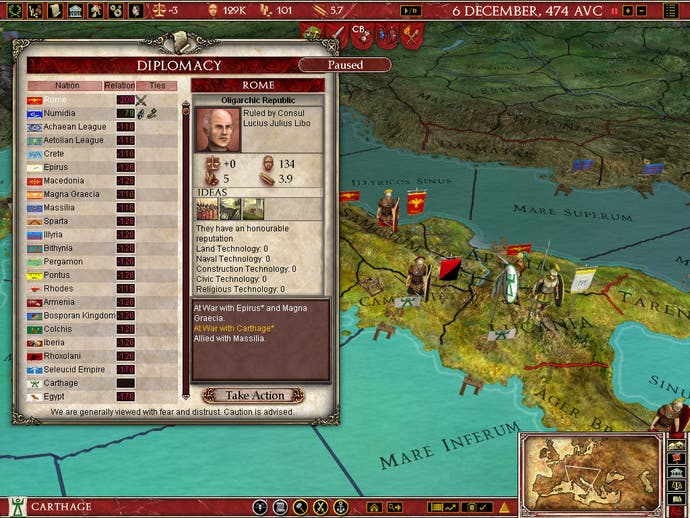PC Roundup
Hard to be a God, Lost Empire, Europa Universalis: Rome, Crusaders.
Europa Universalis: Rome
- Publisher: Paradox Interactive
- Developer: Paradox Interactive
Speak of the Roman Empire (see the previous review), and it turns up on your doorstep as the latest incarnation of the Europa Universalis veteran strategy series. The game's been around since 2001, and the third title was out just last year. This time, the historical warfare clock has been turned back considerably further than the late medieval and Napoleonic eras, to the sapling Roman Empire in 278BC.
As is usual with Europa Universalis, you're free to play any minor or major nation, not just Rome. There are no hard and fast scenario rules, but depending on your choice of country and exact timeframe, there'll be different types of political, economic and diplomatic challenges to deal with.
EU: Rome is all about balance. Spend too much time at war, and the nation and its armies will end up exhausted. Periods of peace are needed to recover and reform, while letting the diplomatic dust settle. Any country that's too fond of marching across borders will gain a reputation, becoming feared, hated and likely attacked on multiple fronts. The game has a realistic ebb and flow of conflict and consolidation.
Peacetime also gives the player a chance to concentrate on internal empire dynamics. New buildings can be constructed in cities to provide various boons, research has to be prioritised and technological directions chosen, faith in your national religion fostered, and trade routes laid between provinces to generate extra income on top of taxes. But the biggest management task is that of dealing with your leaders.
The country's powerful ruling class family members are all rated in various statistics, and must be allocated jobs as researchers, province governors, generals or diplomats. There are tough decisions to make, as often the stats overlap: a chap with a good martial rating should be in charge of an army, but if he has a high charisma as well, he might be better-placed as the governor of a newly conquered province on the edge of your empire. Here his martial score will help keep stability, and his silver tongue will persuade the people that their new ruler and culture really benefits them.

There's a lot of emphasis on man management, with characters having various personality traits. A cruel and corrupt governor won't be popular, but will squeeze more tax out of his province (although he'll pocket a fair bit himself). Loyalty levels have to be watched, and the spectre of possible civil war guarded against. When a hugely successful general lets it all go to his head, there's every chance he might come knocking at the capital city gates, with a load of freshly polished pikes ready for some heads.
EU: Rome's mechanics are deep and fascinating, but there's a great deal of monitoring to be done. Not just of your own staff; there's also the changing politics, attitudes and trade needs of nearby countries to consider. Unfortunately, the interface doesn't make this easy, generally burying information in menus and making the player do a lot of clicking around.
For example, there's no easy way to monitor possible trade routes that become available with foreign powers. You've got to painfully trawl through the bulky diplomacy menu to locate new opportunities. There are other unfriendly facets, such as finicky army movements - it's difficult to time a two-pronged assault so both forces arrive simultaneously.
But despite these issues, there's no doubting that EU: Rome is another largely enjoyable offering from Paradox, and the fresh personnel management aspects add an interesting new twist to the series.
7/10







